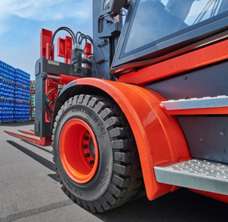 German firm Continental says it recently added recovered carbon black (rCB) to its newly produced Super Elastic solid tyres at its tyre plant in Korbach, Germany, thus reducing the use of fossil raw materials and CO2 emissions. Solid tyres such as Continental’s SC20+ already contain around 60% renewable and recycled materials thanks to their high natural rubber content. By 2050 at the latest, Continental aims to use 100% sustainable materials in its tyre products.
German firm Continental says it recently added recovered carbon black (rCB) to its newly produced Super Elastic solid tyres at its tyre plant in Korbach, Germany, thus reducing the use of fossil raw materials and CO2 emissions. Solid tyres such as Continental’s SC20+ already contain around 60% renewable and recycled materials thanks to their high natural rubber content. By 2050 at the latest, Continental aims to use 100% sustainable materials in its tyre products.
The recovered carbon black is supplied by Pyrum Innovations, one of Continental’s partner companies. Pyrum breaks down end-of-life-tyres into their individual components in industrial furnaces using a special pyrolysis process. This allows valuable raw materials contained in end-of-life-tyres to be extracted and recycled.
Solid tyres have a high load capacity and are extremely stable, puncture-proof, maintenance-free and highly economical. They are mainly used in material handling by forklift trucks, airport vehicles, heavy transport vehicles, sideloaders, platform trucks and other industrial vehicles.
Most forklift trucks in intralogistics are already powered electrically. The range and charging times of the battery employed are therefore important. Tyres with a low rolling resistance can help to keep the energy consumption of electrically powered forklifts low and thus contributing to improved vehicle range.
The rubber compound is crucial for high energy efficiency and therefore low rolling resistance, as valuable natural resources can be saved and the energy consumption of special vehicles reduced. Müller explains: “Our customers want to make their operating processes even more environmentally friendly, resource-saving and efficient. Forklift trucks, for example, are required to do more work in the shortest possible time. This means moving heavier loads and traveling further distances at higher speeds. This is where Continental comes in with its customized tire solutions.”
Industrial carbon black is an important resource used as a filler in tyre production and in the manufacture of other industrial rubber products. The targeted use of carbon black in rubber compounds increases the stability, strength and durability of tyres, it adds.
“In Pyrum, we have found a partner that has developed a particularly efficient pyrolysis process. Together, we want to further develop the process for the pyrolysis of end-of-life tyres,” explains Matthias Haufe, Head of Material Development and Industrialisation at Continental Tires.
In the future, the recovered carbon black will also be used in other Continental compounds. Jointly with Pyrum, the tyre manufacturer is currently working on further optimising and expanding the recycling of end-of-life tyres using pyrolysis.
By 2050 at the latest, Continental says it aims to achieve 100% carbon-neutrality along its entire value chain.
